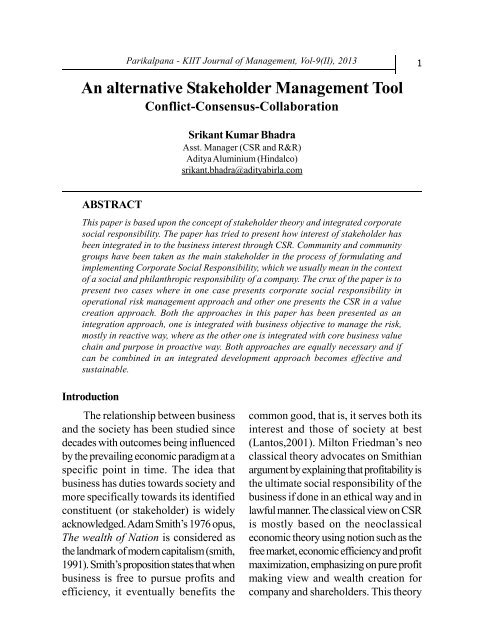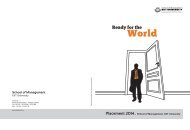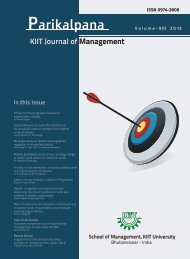Download - School of Management, KIIT University
Download - School of Management, KIIT University
Download - School of Management, KIIT University
Create successful ePaper yourself
Turn your PDF publications into a flip-book with our unique Google optimized e-Paper software.
Parikalpana - <strong>KIIT</strong> Journal <strong>of</strong> <strong>Management</strong>, Vol-9(II), 2013<br />
An alternative Stakeholder <strong>Management</strong> Tool<br />
Conflict-Consensus-Collaboration<br />
1<br />
Srikant Kumar Bhadra<br />
Asst. Manager (CSR and R&R)<br />
Aditya Aluminium (Hindalco)<br />
srikant.bhadra@adityabirla.com<br />
ABSTRACT<br />
This paper is based upon the concept <strong>of</strong> stakeholder theory and integrated corporate<br />
social responsibility. The paper has tried to present how interest <strong>of</strong> stakeholder has<br />
been integrated in to the business interest through CSR. Community and community<br />
groups have been taken as the main stakeholder in the process <strong>of</strong> formulating and<br />
implementing Corporate Social Responsibility, which we usually mean in the context<br />
<strong>of</strong> a social and philanthropic responsibility <strong>of</strong> a company. The crux <strong>of</strong> the paper is to<br />
present two cases where in one case presents corporate social responsibility in<br />
operational risk management approach and other one presents the CSR in a value<br />
creation approach. Both the approaches in this paper has been presented as an<br />
integration approach, one is integrated with business objective to manage the risk,<br />
mostly in reactive way, where as the other one is integrated with core business value<br />
chain and purpose in proactive way. Both approaches are equally necessary and if<br />
can be combined in an integrated development approach becomes effective and<br />
sustainable.<br />
Introduction<br />
The relationship between business<br />
and the society has been studied since<br />
decades with outcomes being influenced<br />
by the prevailing economic paradigm at a<br />
specific point in time. The idea that<br />
business has duties towards society and<br />
more specifically towards its identified<br />
constituent (or stakeholder) is widely<br />
acknowledged. Adam Smith’s 1976 opus,<br />
The wealth <strong>of</strong> Nation is considered as<br />
the landmark <strong>of</strong> modern capitalism (smith,<br />
1991). Smith’s proposition states that when<br />
business is free to pursue pr<strong>of</strong>its and<br />
efficiency, it eventually benefits the<br />
common good, that is, it serves both its<br />
interest and those <strong>of</strong> society at best<br />
(Lantos,2001). Milton Friedman’s neo<br />
classical theory advocates on Smithian<br />
argument by explaining that pr<strong>of</strong>itability is<br />
the ultimate social responsibility <strong>of</strong> the<br />
business if done in an ethical way and in<br />
lawful manner. The classical view on CSR<br />
is mostly based on the neoclassical<br />
economic theory using notion such as the<br />
free market, economic efficiency and pr<strong>of</strong>it<br />
maximization, emphasizing on pure pr<strong>of</strong>it<br />
making view and wealth creation for<br />
company and shareholders. This theory







